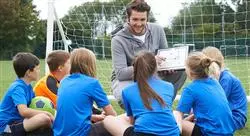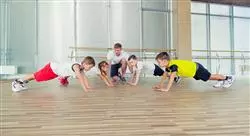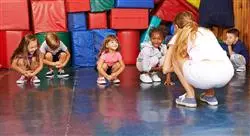
Certificate
Scientific endorser

The world's largest faculty of sports science”
Description
Motor tasks as brain development promoters, from the advanced perspective of neurosciences as applied to teaching, all in a postgraduate diploma of high academic value"

Science has advanced the study of the brain as a learning organ in order to help students develop their cognitive, intellectual and emotional potential to the fullest. Although current education aims to provide comprehensive education, it is still focused on cognitive aspects, with little development in terms of emotional ones; little to no management of one's own and others' emotions, insufficient self-motivation, self-control, and communication skills.
The present postgraduate diploma has the purpose of expanding the benefits that can be offered in the subject of physical education to students, from the perspective of sports performance, academic performance, and also in relation to personal development based on physical and emotional well-being. This is based on new knowledge of brain science to focus, in a practical way, on how to implement it in the environment of educational centers.
The prestigious professors of this program have drawn on their specialized and advanced knowledge based on experience and rigorous scientific criteria in the development of this highly scientifically and academically rigorous training.
All modules are accompanied by abundant iconography, with photos and videos by the authors, which are intended to illustrate, in a very practical, rigorous and useful way, advanced knowledge in neuroeducation and physical education for physical therapists.
With this postgraduate diploma you will be able to train in the most specific areas of brain development linked to motor tasks, from the comfort of your own computer"
This postgraduate diploma in Neuroeducation, Motor Tasks and Brain Development in Sport contains the most complete and up-to-date educational program on the market. The most important features of the program include:
- Development of case studies presented by experts in Neuroeducation and Physical Education
- Its graphic, schematic and eminently practical contents provide scientific and practical information on those disciplines that are essential for professional practice
- It contains practical exercises where the self-evaluation process can be carried out to improve learning
- With special emphasis on innovative methodologies in Neuroeducation and Physical Education
- All of this will be complemented by theoretical lessons, questions to the expert, debate forums on controversial topics, and individual reflection assignments
- Content that is accessible from any fixed or portable device with an Internet connection
- Complementary content available in multimedia format
The syllabus has been chosen and developed by specialists belonging to leading societies and universities of proven prestige. With the highest quality in the education market"
It includes in its teaching staff professionals belonging to the field of Neuroeducation and Physical Education, who pour into this training the experience of their work, in addition to recognized specialists belonging to reference societies and prestigious universities.
Thanks to its multimedia content developed with the latest educational technology, it will allow the professional a situated and contextual learning, that is to say, a simulated environment that will provide an immersive learning programmed to train in real situations.
The design of this program is based on Problem-Based Learning, by means of which the educator must try to solve the different professional La practice situations that arise throughout the Posrgraduate Diploma. For this, the educator will be assisted by an innovative interactive video system, developed by recognized experts in the field of Neuroeducation and Physical Education with extensive teaching experience.
Neurosciences at the service of quality education. Take the next step toward your professional future"

Specialized training that will give a fresh boost to your CV, putting you at the forefront of the profession"
Objectives
The main objective of this comprehensive postgraduate diploma is to provide students with the vision and skills necessary to turn the area of Physical Education into an invaluable tool for the development of integral human well-being. Beyond its potential in physical terms, this postgraduate diploma will work on the protective capacity of the brain, its influence on brain function, emotions, motivation, and perception, in short, learning.

Physical Neuroeducation and learning: an unstoppable stimulus in the development of one of the most promising subjects in education"
General Objectives
- Know the basis and main elements of Neuroeducation
- Integrate the new contributions of Brain Science in the teaching-learning processes
- Discover how to enhance brain development through motor action
- Implement the innovations of Neuroeducation in the subject of Physical Education
- Achieve specialized training as Neuroeducation professionals in the field of motor action
Specific Objectives
- Demonstrate how Physical Education can "attract" learners and be an includion factor in social equity, a fundamental reason to encourage school/kindergarten attendance
- Generate opportunities for teacher exchanges and training, coordinating directors and inspectors to promote higher work quality and efficiency in this institutionalization of School Physical Education
- Permanently update the National and Jurisdictional Database, with data provided directly from the territory by the stakeholders themselves. (Director,Coordinators and Inspectors)
- Produce general guidelines for the Physical Education Area that orient, advise and facilitate the work of Teachers, Coordinating Directors and Inspectors
- Coordination and support to the National Thematic Commissions in this area of knowledge
- Continue the task of achieving the Universalization of Aquatic Activities
- Support the participation of our public schools in different sporting events in order to solve motor situations with a diversity of stimuli and spatial-temporal conditioning factors, selecting and combining basic motor skills and adapting them to the established conditions in an effective manner
- Use the expressive resources of the body and movement in an aesthetic and creative way, communicating sensations, emotions and ideas

Study in a comfortable and easy way, with unlimited access from any place and at any time thanks to the most powerful digital platform and the most developed interactive learning systems currently available"
Postgraduate Diploma in Neuroeducation, Motor Practices and Brain Development in Sport
Neuroeducation is a discipline that combines knowledge of neuroscience with teaching and learning processes. In the field of sports, its mastery is increasingly important to understand how the brain and the body interact in the practice of physical activities, offering the option of adapting exercise to the characteristics of each individual. Therefore, sports professionals must identify the intricacies of this area in order to perfect their daily performance. Consequently, and in order to provide you with the most relevant knowledge in this field, TECH has opted to create the Postgraduate Diploma in Neuroeducation, Motor Practices and Brain Development in Sport.
Study a highly prestigious academic program
.
Through this complete program, you will be able to learn how physical exercise favors the evolution of cognitive functions, to detect motor practices that indicate brain development or to analyze the relevance of motor action for the prevention of numerous diseases. In this way, you will be positioned as a leading professional in the world of Sports Science. All this, without the need to attend classes or waste time on daily commuting, thanks to the online modality presented by the Postgraduate Diploma in Neuroeducation, Motor Practices and Brain Development in Sport.






